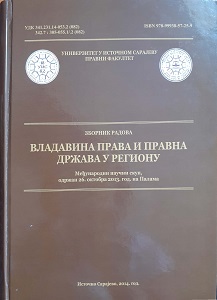Vladavina prava i ovlašćenja ombudsmana
Rule of Law and Competences of the Ombudsman
Author(s): Nada Grahovac
Subject(s): Human Rights and Humanitarian Law
Published by: Правни факултет Универзитета у Источном Сарајеву
Keywords: Rule of law;Human rights and freedoms;Institution of ombudsman;Authority of ombudsman to initiate proceedings before the Constitutional Court;
Summary/Abstract: Institution of Ombudsman was introduced to legal system of Bosnia and Herzegovina by the Law on Ombudsman for Human Rights which was imposed by High Representative for B&H in 2000 and adopted in its original text by the Assembly of B&H Parliament in 2002. In its field of work Institution of Ombudsman faced lack of legally defined authorities for efficient exercise of Ombudsman mandate. It is emphasized that the Law on Ombudsman for Human Rights of Bosnia and Herzegovina did not give authority to the Institution to initiate laws and other bylaws that are important for respecting and protection of citizen’s rights as well as to initiate procedure before the Constitutional Court for legal removal of those laws and bylaws that lead to violation of citizen’s rights. Such legal solution is not only contrary to the Parisian Principles that set guidelines for establishing of institution, its competencies and independence of the institution for protection of human rights but it also con-strains institution’s abilities to protect citizen’s rights in individual cases and in its preventive activities. If it is kept in mind that, by definition, ombudsman is protector of legality and citizen’s rights, than his/her authorities must be widely and clearly stated in a way that allows him/her to meet requirements when facing mechanism of protection of human rights. That, among other things, includes authority of ombudsman to initiate proceedings in cases when, in his/her view, violation of human rights is a result of poor or faulty regulations, and ombudsman’s authority to initiate proceedings before the Constitutional Court in order to prevent violations of citizen’s rights that are consequence of application of the law and other regulations that are not in accordance with the Constitution and international standards for protection of human rights.
- Page Range: 309-319
- Page Count: 11
- Publication Year: 2013
- Language: Serbian
- Content File-PDF

